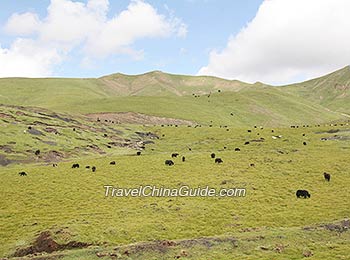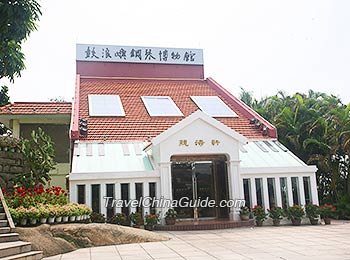During the 41th World Heritage Convention held in July 2017, China's Gulangyu Island and Hoh Xil Natural Reserve were inscribed respectively as world cultural and natural heritages by the UNESCO. To date, China owns 52 world heritage sites.
Hoh Xil means green mountain ranges in Mongolian and a beautiful girl in Tibetan. It ranks as the highest one in the current world heritage list, with an average altitude of 4,500 meters (14,760 feet). The highland is home to abundant plants and animals, especially for Tibetan antelopes.
In the late 20th century, cashmere products made by Tibetan antelope wools gained popularity in market. Driven by the great profit, some merchants and hunters risked to poach Tibetan antelopes. There was a time that the amount of this species on the plateau reduced to less than 20 thousand.
In 1995, the Hoh Xil Natural Reserve was founded to improve the situation. Fortunately, with the efforts from all sectors, more than 60 thousand Tibetan antelopes now inhabit in the hinterland of Hoh Xil. The UNESCO remarked it as a vast stunning land hardly disturbed by mankind. A complete migratory route of Tibetan antelopes is preserved in the natural reserve.
Gulangyu Island, located in Xiamen Fujian, faces to Taiwan across the Taiwan Strait. Flowers blossom here in all seasons. Along zigzag coastlines, architectures of different styles are well arranged. In deep lanes, piano sounds fill the air. No wonder it has gained the reputation as a World Architecture Museum and a garden on the sea. Since 1843, it has served as a trading port. From then on, it has been a settlement for foreign expats. 13 countries including the UK, US and Japan have set up consulates there. The island witnessed the process of China stepping into modern times as well as the integration of local and exotic cultures.
As an official commented, "Being listed as world heritage is not our purpose. We just want the world to focus on the two sites and protect them." Though we can see efforts made in maintaining the heritages, it’s still a long way to go to preserve them.
|
|
Status Quo of the Two Sites
In the late 20th century, cashmere products made by Tibetan antelope wools gained popularity in market. Driven by the great profit, some merchants and hunters risked to poach Tibetan antelopes. There was a time that the amount of this species on the plateau reduced to less than 20 thousand.
In 1995, the Hoh Xil Natural Reserve was founded to improve the situation. Fortunately, with the efforts from all sectors, more than 60 thousand Tibetan antelopes now inhabit in the hinterland of Hoh Xil. The UNESCO remarked it as a vast stunning land hardly disturbed by mankind. A complete migratory route of Tibetan antelopes is preserved in the natural reserve.
Gulangyu Island, located in Xiamen Fujian, faces to Taiwan across the Taiwan Strait. Flowers blossom here in all seasons. Along zigzag coastlines, architectures of different styles are well arranged. In deep lanes, piano sounds fill the air. No wonder it has gained the reputation as a World Architecture Museum and a garden on the sea. Since 1843, it has served as a trading port. From then on, it has been a settlement for foreign expats. 13 countries including the UK, US and Japan have set up consulates there. The island witnessed the process of China stepping into modern times as well as the integration of local and exotic cultures.
As an official commented, "Being listed as world heritage is not our purpose. We just want the world to focus on the two sites and protect them." Though we can see efforts made in maintaining the heritages, it’s still a long way to go to preserve them.

